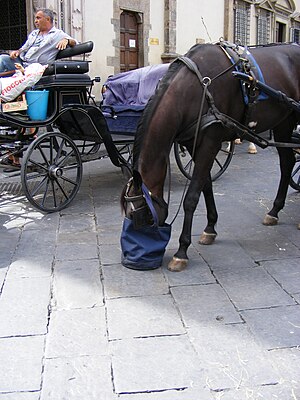σφυρίς: Difference between revisions
Ἀναξαγόρας δύο ἔλεγε διδασκαλίας εἶναι θανάτου, τόν τε πρὸ τοῦ γενέσθαι χρόνον καὶ τὸν ὕπνον → Anaxagoras used to say that we have two teachers for death: the time before we were born and sleep | Anaxagoras said that there are two rehearsals for death: the time before being born and sleep
m (Text replacement - "(?s)({{ls\n\|lstext.*}}\n)({{.*}}\n)({{elnl\n\|elnltext.*}}\n)" to "$3$2$1") |
m (Text replacement - "(?s)(==Wikipedia EN==)(\n)(.*)(\n[{=])" to "{{wkpen |wketx=$3 }}$4") |
||
| Line 28: | Line 28: | ||
|ftr='''σφυρίς''': {sphurís}<br />'''See also''': s. [[σπυρίς]].<br />'''Page''' 2,835 | |ftr='''σφυρίς''': {sphurís}<br />'''See also''': s. [[σπυρίς]].<br />'''Page''' 2,835 | ||
}} | }} | ||
= | {{wkpen | ||
[[File:Pferde-Fresssack.jpg|thumb|A horse eating from a [[feedbag]] in Florence, Italy]] | |wketx=[[File:Pferde-Fresssack.jpg|thumb|A horse eating from a [[feedbag]] in Florence, Italy]] | ||
A feedbag, feed bag, feeding bag, nosebag, or morral, is a bag, filled with fodder, and attached to the head of a horse, enabling it to eat. The main advantages are that only a small amount of the feed is wasted, and it prevents one animal consuming the ration of another. | A feedbag, feed bag, feeding bag, nosebag, or morral, is a bag, filled with fodder, and attached to the head of a horse, enabling it to eat. The main advantages are that only a small amount of the feed is wasted, and it prevents one animal consuming the ration of another. | ||
| Line 37: | Line 37: | ||
In popular US culture, the feedbag is used in the expression "strap on the old feedbag", meaning to "dine". It suggests that the diner will pay little attention to etiquette, and will dine heartily. The term is also found in numerous restaurant names. | In popular US culture, the feedbag is used in the expression "strap on the old feedbag", meaning to "dine". It suggests that the diner will pay little attention to etiquette, and will dine heartily. The term is also found in numerous restaurant names. | ||
}} | |||
{{trml | {{trml | ||
|trtx=Bulgarian: торба за зоб; Catalan: morral; French: musette; German: Futtersack; Ancient Greek: [[χιλωτήρ]]; Irish: socmhála, mála cinn | |trtx=Bulgarian: торба за зоб; Catalan: morral; French: musette; German: Futtersack; Ancient Greek: [[χιλωτήρ]]; Irish: socmhála, mála cinn | ||
}} | }} | ||
Revision as of 17:35, 11 October 2022
English (LSJ)
ίδος, ἡ,
A = σπυρίς (q.v.); nose-bag, nose bag, nosebag, feedbag, feed bag, feeding bag, morral, nosebag for cattle, nosebag for horses, feedbag, feed bag, feeding bag, morral, nose-basket, PSI5.543.54 (iii B.C.).
German (Pape)
[Seite 1052] ἡ, att. statt σπυρίς, Geopon.; auch Hippocr.; s. Lob. Phryn. 113.
Dutch (Woordenboekgrieks.nl)
σφυρίς -ίδος, ἡ, zie σπυρίς mand, korf.
Greek Monolingual
Greek (Liddell-Scott)
σφυρίς: Ἀττ. σπυρίς.
Frisk Etymological English
See also: s. σπυρίς.
Frisk Etymology German
σφυρίς: {sphurís}
See also: s. σπυρίς.
Page 2,835
Wikipedia EN

A feedbag, feed bag, feeding bag, nosebag, or morral, is a bag, filled with fodder, and attached to the head of a horse, enabling it to eat. The main advantages are that only a small amount of the feed is wasted, and it prevents one animal consuming the ration of another.
It can be made of leather, reeds, but more commonly is a thick fabric or light canvas. Some modern designs are made of Cordura or other durable nylon, with a solid bottom and mesh sides for ventilation.
To access the portion of the feed near the bottom of the bag, the horse needs to be able to touch its head to the ground, allowing it to push its nose into the end of the bag.
In popular US culture, the feedbag is used in the expression "strap on the old feedbag", meaning to "dine". It suggests that the diner will pay little attention to etiquette, and will dine heartily. The term is also found in numerous restaurant names.
Translations
Bulgarian: торба за зоб; Catalan: morral; French: musette; German: Futtersack; Ancient Greek: χιλωτήρ; Irish: socmhála, mála cinn
